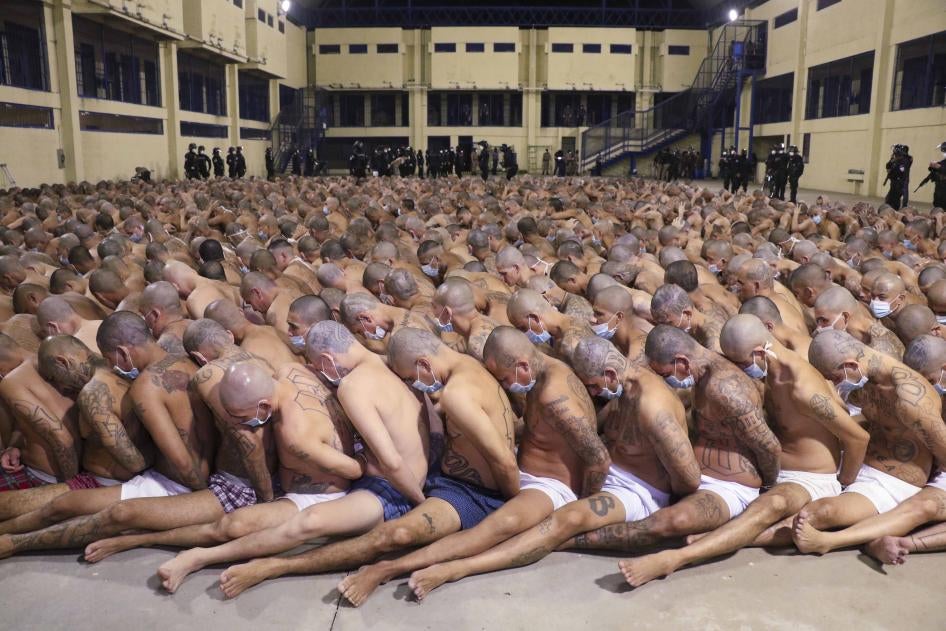If one were intent on spreading coronavirus, one would pack many people into tightly crowded, unhygienic spaces with poor ventilation, irregular access to water, deficient medical care, and little testing to know who is infected with the virus. One would, in other words, open a Latin American or Caribbean prison.
Social distancing is impossible in prisons systems like those of Haiti, Bolivia, Guatemala, El Salvador, and Honduras, where occupancy rates range from 200 to 400 percent of official capacity.
Once there is an outbreak inside a prison, overcrowded and unsanitary conditions can lead to rapid spread. This could have dreadful consequences, not just for inmates but also for staff and for the population at large.
Reducing overcrowding immediately is key to preventing widespread infection.
As the first cases of Covid-19 were confirmed in Latin America and the Caribbean, most countries didn’t even try to create meaningful distancing to protect the 1.7 million people incarcerated in the region. Instead, many opted to act as though they could completely seal prisons off to the outside world by cancelling visits and exit permits indefinitely. Of course, staff and contractors come and go, and new detainees arrive every day. Without robust testing programs, it was just a matter of time before the virus seeped behind bars.
And so it has. Chile already has about 700 confirmed cases among detained people and prison staff; Brazil, more than 900; Colombia, more than 1,000; and Peru, about 1,500. Covid-19 is confirmed to have killed at least 160 detainees and prison staff across the region, almost three quarters of them in Peru.
The true extent of the spread in Latin American and Caribbean detention facilities is unknown due to a lack of testing in many countries. In Brazil, which has 746,000 detainees—the third largest prison population in the world—only 0.4 percent have been tested.
Not surprisingly, detainees have risen up across the region to demand protection. Since March, at least 54 imprisoned people have died and hundreds have been injured in protests in Colombia, Venezuela, Argentina, and Peru. Prisoners say that they don’t have soap or adequate medical care and that cancelled visits mean their relatives can no longer bring them food and hygiene products.
Some countries have taken important initial steps to diminish prison overload. Chile has granted house arrest to about 1,600 people— over 5 percent of about 29,000 convicted detainees— and judges have released about 10 percent of 13,000 pre-trial detainees, said the Public Defender’s Office.
They are older people, pregnant women, and women with small children—all convicted of low-level offenses. [Under Chilean law, only individual judges, not the government, can make decisions regarding the release of the existing 14,000 pretrial detainees.]
In Brazil, judges have released 30,000 people—about 4 percent of the prison population—in response to a recommendation by the National Council of Justice, the body in charge of developing judicial policies, the Council told Human Rights Watch. In contrast, the Jair Bolsonaro administration opposes releases and insisted, without success, in using shipping containers to isolate some there. The ban was established after a 2010 uproar over inhumane conditions in such makeshift prison housing.
In other countries releases have been much smaller. Judges in Argentina and Honduras have released or granted house arrest to about 1 percent of the prison population. In Mexico, judges have released about 2,000 people—also about 1 percent of the prison population—at the request of state governments. Peru has released 1,067 out of 97,000 detainees, Colombia just 566 out of 122,000 detainees, and Bolivia, only 2, said a judge, out of more than 18,000.
In El Salvador, judges are considering the release of 557 older people, out of 38,000 detainees. In Guatemala, justice officials have pledged to grant early releases, but have provided no data about it. In Ecuador, judges have merely promised to speed up procedures for early release for detainees, while the government has said it would pardon a “very few” incarcerated people.
Governments have an obligation to protect the health of people in their custody. In the context of Covid-19, that means they need to ensure that social distancing is feasible. With the limited releases that have occurred so far, most Latin American prisons remain far too crowded.
Decreasing overcrowding can be accomplished legally and safely, even while protecting public security. And it can help to defuse prison uprisings over—among other deficiencies—lack of action to slow the spread of the coronavirus.
The authorities should focus on reducing pretrial detention—37 percent of all incarcerated people in the region—by releasing those awaiting trial for nonviolent crimes. They should also prioritize releases of those convicted of nonviolent crimes who are nearing the end of their sentences.
And they should consider releasing detainees who are at higher risk of severe illness or death from Covid-19, while the current health emergency persists—older people, pregnant adults and adolescents, and people with certain underlying health conditions. They should also evaluate all child detainees and people who are caregivers to children or others for possible release. Decisions, in such cases, would take into account factors like time served, the gravity of the crime, and the risk the release would represent to the public. Authorities could determine whether to impose such conditions as electronic anklets or house arrest to monitor those released.
Governments and justice officials need to act urgently. It’s a question of life or death, not only for incarcerated people, but also for the population at large.









